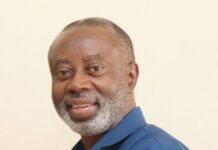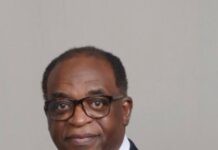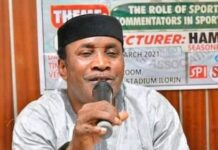Yours comradely was the privileged Guest speaker at the inaugural June 12 celebration. My few remarks were however happily drown in the cacophony of multiple songs in praise of the reclaimed democratic space during the historic carnival celebration at the Metropolitan Square in Ilorin. Which underscored the main point in my few remarks that with all its imperfections, democracy retains its validity and vitality according to Abraham Lincoln “as the government of the people by the people”. It remains the best form of government compared to crass military dictatorship in 30 years of Nigeria’s 59 years as an independent nation. Never again should anybody rule us again without our mandate. And never should anybody annul people’s votes. In fact vote annulment and ballot snatching should be treated as acts of treason. Alternative to democracy should be more democracy not less.
I congratulate all Kwarans through my brother HE Governor Abdulrahman Abdulrazaq on the occasion of the 20th anniversary of uninterrupted civil rules. Governor Abdulrahman Abdulrazaq is a Governor of destiny as an anniversary 4th democratically elected Governor in this dispensation and 7th civilian Governor. In its 52 years of existence, Kwara has produced 20 governors, out which only 7 were democratically elected. Kwara had an unfair share of military administrators. With 16 years of PDP-one party/one person rule, Kwara’s democracy assumes a special importance which must be nurtured through civic education for active citizenship right from schools in order to obliterate the ingrained slave/leader/dealer mentality. Both June 12 and O TO GE MOVEMENT (Enough-Is-Enough) are two sides of the same national Democratic Coin.
In June 12, 1993, millions of Nigerians trooped out to vote by queuing behind their two respective Presidential candidates, MKO Abiola of SDP and Bashir Tofa of NRC. The numbers of June 12th elections revealed genuine contest. Late Chief Moshood Abiola of Social Democratic party (SDP) had 8.3 million votes while Tofa of NRC had 6 million votes. Nigerians rightly resolved to put an end to military dictatorship. Despite the provocations of the military regime through serial shifting of dates and programmes in an endless political transition, Nigerians resolved to vote out the military. It was a national O TO GE MOVEMENT as it were but the nation lacks the right word from Kwara (ILORIN) the word: Enough is Enough (O TO GE MOVEMENT). I suggest that Governor Abdulrahman must patent O TO GE brand as a source of revenue for the State of Harmony. 26 years after the annulment of June 12 elections and President Buhari justifiably honored the late winner, Kwaran voters trooped out in their thousands to peacefully vote out 16 years of PDP/one person dictatorship in a globally acknowledged free and fair election under the banner of O TO GE MOVEMENT. Thanks to a President Buhari and INEC for making the votes count. I was a labour delegate to the 2014 National Conference. The Elder statesman Edwin Clark was a Federal government delegate member. During the confab, there was a healthy special session to reflect on 1993 election annulment. Chief Edwin Clark said (and I quote him) “but for the small mindedness and pettiness of one man” June 12th should have been the Democracy Day, not May 29. According to him President Olusegun Obasanjo arbitrarily fixed May 29 as Democracy Day, while the preference of Nigerians was for June 12th. Again thanks to President Buhari for declaring June 12th as the Nigeria’s real democracy Day. Nigeria has not only risen above “the pettiness of one man” but through this new national consensus on the new Democracy Day, Nigeria has conclusively put a welcome closure to the tragedy of the annulment of 1993 popular election won by Chief Moshood Abiola.
In addition to investiture of the late Chief M.K.O. Abiola, late Chief Gani Fawehinmi and Babagana Kingibe with National Honours, President Buhari has also commendably proposed “the re-naming of the Abuja National Stadium as MOSHOOD ABIOLA NATIONAL STADIUM”. The President was being modest in saying that this bagful of posthumous recognitions was “to partially atone for the previous damage done in annulling the Presidential elections of that year.” Certainly more posthumous recognitions are needed for great men and women who sacrificed for the struggle for democracy. Great patriots like the then NEC Chairman Humphrey Nwosu (who dared the military to conduct the elections), the late Chief Enahoro, Prof. Soyinka, Comrade Ola Oni, a legendary radical lecturer-activist, deserve recognition. The significance of the courageous decision of Buhari administration cannot be overstated. In essence Buhari administration has shown that Time is truly longer than the Rope of Military dictators ! I recall that in 1993, shortly after the annulment in 1993, Chief Moshood Abiola almost prophetically told the Cable News Network (CNN) that “His (i.e. Ibrahim Banbagida) decisions can be changed, it is not a law of Moses written on the stone taken down from the mountain.”.
June 12 revalidation is of both ideological and emotional importance to me. At personal level, my self and my late wife, Hadjia Hamdalat Abiodun Aremu had promised to name our then expected second child boy after the military President Ibrahim Badamosi Babangida. But that was IF he had exhibited the expected courage, patriotism and statesmanship to conclude the most protracted political transition by declaring the winner of the adjudged freest and free election. Precisely because IBB failed the historic test of statesmanship, we named our son after Moshood Abiola the winner of the election. He turned 26 years this year as a June 12 anniversary child. The challenge is that of democratic sustainability and consolidation. Nigeria must resist the temptation of sliding back to the discredited military dictatorship which also destroyed professionalism of the armed forces. All Nigerians must be commended for making Nigeria a Democracy destination in Africa notwithstanding the daunting challenges. Since 1993, we have commendably had another set of elections, including “civilian-to-civilian” elections in 1999, 2003, 2007, 2011, 2015 and 2019. Historians of elections are at liberty to assess the strength and pitfalls of each of these national elections. But they were elections nonetheless!
Issa Aremu mni



